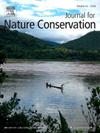平衡保护与商业:一个关于信息如何影响人们购买中国大熊猫国家公园蜂蜜意愿的案例研究
IF 2.5
3区 环境科学与生态学
Q2 BIODIVERSITY CONSERVATION
引用次数: 0
摘要
提高保护区农产品的价值已成为在平衡保护与经济发展的同时支持当地社区的一项关键战略。本研究探讨不同类型的资讯如何影响消费者对国家公园认证产品的支付意愿。以中国大熊猫国家公园的蜂蜜为例,我们对北京居民进行了实地实验,以研究关注生物多样性保护、农村社区支持或两者结合的信息传递如何影响他们对产品的WTP。结果表明,强调生物多样性保护的信息显著增加了消费者的WTP,而强调农村社区支持的信息则没有类似的效果。此外,结合两种类型的消息不会产生额外的好处,这可能是由于信息过载或消息清晰度降低所致。这些发现强调了明确和有针对性的信息在激励消费者支持环保产品方面的重要性,并为培育以保护为导向的市场提供了可行的见解。本文章由计算机程序翻译,如有差异,请以英文原文为准。
Balancing conservation and commerce: a case study of how information shapes willingness to pay for honey from China’s Giant Panda National Park
Enhancing the value of agricultural products from protected areas has emerged as a key strategy for supporting local communities while balancing conservation and economic development. This study investigates how different types of information influence consumers’ willingness to pay (WTP) for products certified by national parks. Using honey from China’s Giant Panda National Park as a case study, we conducted a field experiment with Beijing residents to examine how messaging focused on biodiversity conservation, rural community support, or a combination of both impacted their WTP for the product. The results reveal that messages emphasizing biodiversity conservation significantly increase consumers’ WTP, whereas messages highlighting rural community support do not have a similar effect. Furthermore, combining both types of messages does not yield additional benefits, potentially due to information overload or reduced message clarity. These findings underscore the importance of clear and targeted messaging in motivating consumers to support eco-friendly products and provide actionable insights for fostering conservation-oriented markets.
求助全文
通过发布文献求助,成功后即可免费获取论文全文。
去求助
来源期刊

Journal for Nature Conservation
环境科学-生态学
CiteScore
3.70
自引率
5.00%
发文量
151
审稿时长
7.9 weeks
期刊介绍:
The Journal for Nature Conservation addresses concepts, methods and techniques for nature conservation. This international and interdisciplinary journal encourages collaboration between scientists and practitioners, including the integration of biodiversity issues with social and economic concepts. Therefore, conceptual, technical and methodological papers, as well as reviews, research papers, and short communications are welcomed from a wide range of disciplines, including theoretical ecology, landscape ecology, restoration ecology, ecological modelling, and others, provided that there is a clear connection and immediate relevance to nature conservation.
Manuscripts without any immediate conservation context, such as inventories, distribution modelling, genetic studies, animal behaviour, plant physiology, will not be considered for this journal; though such data may be useful for conservationists and managers in the future, this is outside of the current scope of the journal.
 求助内容:
求助内容: 应助结果提醒方式:
应助结果提醒方式:


